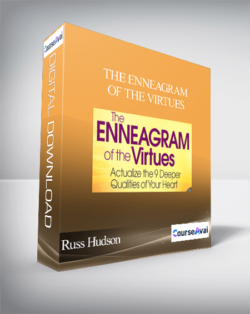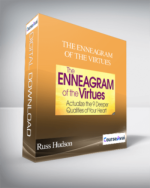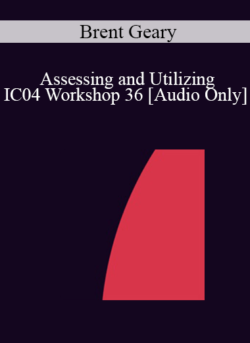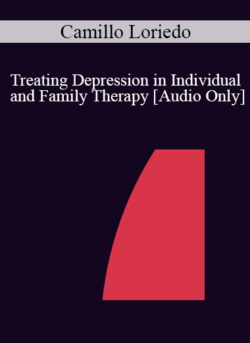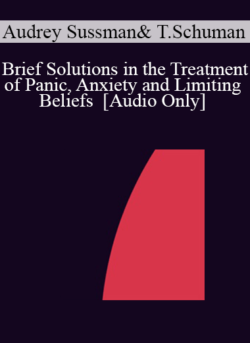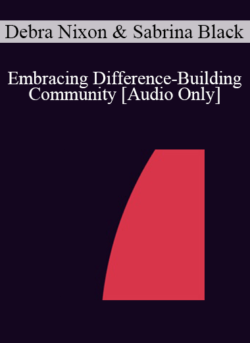In this rare exploration of the Enneagram of the Virtues, Russ Hudson will guide you to discover the vein of gold that runs through a present and authentic inner experience, restoring your connection with your Higher Self.Purchase The Enneagram of the Virtues with Russ Hudson courses at here with PRICE $297 $85The Enneagram of the Virtues with Russ HudsonWhat You’ll Discover in These 13 In-depth ModulesIn this rare exploration of the Enneagram of the Virtues, Russ Hudson will guide you to discover the vein of gold that runs through a present and authentic inner experience, restoring your connection with your Higher Self.Each of the 10 contemplation and training sessions is pre-recorded and will build harmoniously upon the next. You’ll develop a complete, holistic understanding of the practices, tools and principles you’ll need to explore your fixations, essence, and Virtues. Cultivating the 9 heart qualities, you’ll open to a more expansive and liberated life.Module 1: The Enneagram & the Alchemy of the HeartAn Overview of the Transformation of the PassionsOne of the great themes of Eastern and Western spirituality, is the challenge of dealing with human suffering. In Buddhism, the First Noble Truth addresses suffering as the reason for the Buddhist path, also major theme of of Judaism, Christianity, and Islam. In its original presentation, the Enneagram was not primarily a system of type — more precisely, it did not say that type was a person’s identity.Rather, the type aspect of the Enneagram teachings came from the Desert Fathers of Egypt — the first Christian contemplatives — as a means to look at the forms of suffering that distracted monks from their prayer and meditation.These teachings were a study of how we lose sight of the Divine. Yet, they also look at how human suffering is transformed by presence and grace into what came to be called the Virtues — the qualities of the awakened heart.In this first module, you’ll discover:The specific relationship between the heart’s suffering, and qualities of presence and graceHow working with each Enneagram point is a study of a particular state of “heart presence”The alchemy of restored presence as the process that begins to turn the heart towards its true source — its “Beloved”Each of the nine points as a specific journey of the heartThe “alchemical gold” of inner work — the results of cultivating our true inner lifeHow the Virtues reflect the qualities of a real teacher — the signs of someone who has actually been on the authentic journey of awakeningThe 9 Virtues as doorways to another kind of human community — the alternative to fear as an organizing principleModule 2: Type EightLust Into Innocence & MercyIn this module, we’ll look at Type Eight, not just as a kind of person, but as an overall principle of life and a quality of presence. Those whose psyches are organized most around these Type Eight issues and gifts will have this teaching as a main path in their lives.Here we look at how it is natural for human beings to feel fully alive, and to experience this in the heart as an exquisite sensitivity.The ego seeks to have the aliveness without the sensitivity and thus creates suffering as a struggle to feel real and alive. As we presence this struggle, we’re touched by Innocence — a profound open-heartedness.In the second module, you’ll discover:The natural state of aliveness and authenticity — a basic element of grounded presenceHow to recognize and experience the qualities of Innocence and Mercy in your daily lifeThe real meaning of the passion of “lust”The various psychological and practical challenges to working with lustThe core suffering at the root of the passion of lustThe resolution of the primary inner conflict in Type EightModule 3: Type NineSloth (Inertia) Into EngagementIn this module, Type Nine will teach us about the nature of Being, and what our heart is like when we have come home to the here and now. We’ll see the suffering that arises as we lose our direct experience of Being.Those whose psyches are organized most around these Type Nine issues and gifts will have this teaching as a main path in their lives. It’s an extraordinary thing when a person truly feels at home in herself — grounded, confident and part of the vibrant world.When we lose presence, we tend to feel adrift, and estranged from our own lives. The ego, not wanting to fully feel how distant we have become from our own direct heart experience, seeks to calm us by creating “our own little world” — a way to disengage from the full impact of missed possibilities.As we presence this struggle, however, we begin to be touched by greater and greater engagement — a total commitment and love of exactly where we are and who we are. We will deeply contemplate and explore the experience of the Engaged Heart.In the third module, you’ll discover:The natural state of harmonious, grounded presence — the sense of wholeness and flow with lifeHow to recognize and experience more deeply the qualities of full engagement in our daily livesThe real meaning of the passion of “Sloth,” which is not “laziness” but rather a habitual state of withdrawn attentionThe various psychological and practical challenges to working with SlothThe core suffering at the root of the passion of SlothThe resolution of the primary inner conflict in Type NineModule 4: Type OneAngry Resentment Into SerenityType One directly addresses the reactivity in the heart which is the basis of much of our suffering. We want to be a force of good in the world, and to live a life of integrity and truth as much as possible. Yet, without presence, it is nearly impossible to not react to the seemingly endless array of injustices, distortions, untruths, and outright suffering we see. How do we support real solutions AND remain serene within?In this module, we will see how awareness of our reactions helps us see the goodness within and around us — the source of true wisdom and integrity.Serenity is not a given, but a quality of grace that grows in us as we learn to hold our reactivity and steadiness and kindness. Here, we’ll see how our outrage can be transmuted into compassionate action. We’ll contemplate and explore the experience of Serenity.In the fourth module, you’ll discover:The natural state of goodness and integrity — whenever we open our hearts to present experienceHow to recognize and experience more deeply the qualities of Serenity in your daily lifeThe real meaning of the passion of “Angry Resentment”The various psychological and practical challenges to working with Resentment and FrustrationThe core suffering at the root of the passion of Angry ResentmentThe resolution of the primary inner conflict in Type OneModule 5: Type TwoPride Into HumilityMost spiritual paths emphasize the value of humility, yet often, our attempts to “be humble” result in a great deal of self-consciousness, and an attempt to rise above our needy human condition. We may associate humility with having few needs, and yet this is exactly the suffering of pride.Type Two shows us beautifully that when we are present in the heart, we naturally feel connected with anyone we are with, we feel a deep-rootedness in our own heart, and we experience the joy of giving and receiving freely — part of the vast generosity of reality. When we are not present, we do not feel connected on a heart level, and so think it is our job to connect others or with others, to be the source of generosity, and to need as little as possible from others.Underlying all of this is the deep ego conviction of our unworthiness and unlovability. Yet, when we are able to presence our lonely, isolated hearts, we find an infinite kindness toward our own and others’ suffering.We stop rejecting our needs and longings and begin to understand what it might actually mean to care for our soul, for our hearts. In this way, true humility arises. We’ll explore humility as a compassionate relatedness with our humanness — to love the messy edges of our lives, and to realize that the most direct path to the divine is in the holding of all of our raw, beautiful humanity. We’ll contemplate and explore the experience of humility, and see its action in our lives and loves.In the fifth module, you’ll discover:The tender aspects of presence — the sense of loving kindness natural to the heartHow to recognize and experience more deeply the quality of humility in your daily lifeThe real meaning of the passion of Pride, which is often misunderstood, is a major challenge for those in helping professionsThe tremendous pressure we put on ourselves to “be there” for others while neglecting our own souls, and explore the deeper states of our hearts when we notice that we’re doing thisThe various psychological and practical challenges to working with PrideHow our spiritual paths can support this patternThe core suffering at the root of the passion of PrideThe resolution of the primary inner conflict in Type TwoModule 6: Type ThreeVanity (Vainglory) Into AuthenticityOne of the main causes of our suffering is mistaking ourselves to be the ego self. The problem is not that we have an ego, but that we think we are the ego. When we’re not present, we spend most of our time, energy, and imagination, involved in ways to enhance our ego self.Since this isn’t actually the our “true self,” even when we succeed, we’re left feeling empty. So we throw ourselves into the next round of work to compensate. Thus, Vanity here means the suffering created by trying to make the ego be something it cannot be.When we bring tenderness and patience to this part of ourselves, and as we start to recognize something of the nature of our true selves, we begin to develop the virtue of Authenticity; our words and our actions flow from the heart.Increasingly, all that we do is an expression of love and service to the people in our lives. We enjoy what we are doing and it find great fulfilment in all of our activities, and meet people with a genuine open-heartedness which is unmistakable. We’ll contemplate and explore the experience of authenticity, and see its action in our lives and loves.In the sixth module, you’ll discover:The felt sense of “being ourselves,” and simply being the truth of this momentHow to recognize and experience more deeply the qualities of Vanity in your daily lifeThe narcissism of daily life and the real meaning of the passion of Vanity, which is the ego’s striving to be the “real me”The various psychological and practical challenges to working with Vanity and Self DeceptionThe core suffering at the root of the passion of VanityThe resolution of the primary inner conflict in Type ThreeModule 7: Type FourEnvy Into EquanimityWhen we lose the sense of presence — an apparently inevitable consequence of ego development, our heart experiences the loss of contact as a feeling of loss and abandonment.What we have lost is the direct experience of ourselves, and of our true identity. This is an enormous loss and produces great suffering. Our ego identities arises to try to compensate, but are constructs mainly of our interpretations of our history and a collection of familiar emotional states and moods. Our true identities however are mysterious — deep, profound and beautiful — and nearly impossible to “pin down.”When we bring compassionate presence and some experience of the depth of our true identities to our suffering ego, we begin to release old and outmoded attachments. Our hearts seems to expand and to take on an oceanic quality.The virtue of Equanimity develops as the ability to be with the full range of human emotions in ourselves and others without getting stuck in them. It’s a spaciousness of heart and one of the marks of a truly developed person.In the seventh module, you’ll discover:The mystery of identity and how it affects our experience of ourselves and the worldHow to recognize and experience more deeply the qualities of Equanimity in your daily lifeThe real meaning of the passion of “Envy,” generally expressed as chronic disappointment and dissatisfaction with our livesThe various psychological and practical challenges to working Envy and disappointmentThe core suffering at the root of the passion of EnvyThe resolution of the primary inner conflict in Type FourModule 8: Type FiveAvarice Into Non-attachmentAll human beings struggle with the awareness of our own and others’ mortality. When we’re not present, this awareness can be so difficult and overwhelming that we spend our lives distracting ourselves, or retreating from life’s apparent futility.This can lead to the passion of Avarice, a radical withholding of ourselves and particularly a withholding of our hearts. We recoil from life and from contact. The world seems insane and pointless.As we bring compassionate presence to this reaction, we begin to feel an implicit intelligence in everything that draws us back into deeper contact with the world. As this healing occurs, we develop the virtue of Non-attachment. We’re still aware of the fragility of life but this same knowing now produces great kindness and helpfulness — and we’re in service to alleviating suffering wherever we can. Our minds and hearts now work seamlessly together.In the eighth module, you’ll discover:The quality of discovery and illumination of experience and how “direct knowing” operates in our livesHow to recognize and experience more deeply the qualities and benefits of Non-attachment in your daily lifeThe real meaning of the passion of Avarice, which is generally not the withholding of knowledge as is often supposedThe various psychological and practical challenges to working our AvariceThe core suffering at the root of the passion of AvariceThe resolution of the primary inner conflict in Type FiveModule 9: Type SixFear (Angst) Into CourageMany spiritual teachings point to fear as one of the primary drivers of ego activity. The Course in Miracles, for example, describes fear as the main energy that takes us away from love and presence. Here at Type Six, we encounter the question, what is this fear? What is causing it? And what is life like when we go through it and beyond it?We begin to see that our lives run with an underlying layer of constant anxiety — a causeless and often nameless dread. As we bring compassionate presence and awareness to this fear, we begin to experience the virtue of Courage.Courage here does not require danger, nor is it necessarily a response to danger. Rather, we’re concerned here with the courage of being ourselves all the way, of living our truths and seeing through the fears that turn us back from what we love the most. It’s a fullness of heart that supports us in showing up fully in our lives.In the ninth module, you’ll discover:The miracle of our awakeness — the fact that we can be awake and aware of anything in our experience, inner or outer, and that this awakeness helps us navigate our lives more confidently and effortlesslyHow to recognize and experience more deeply the qualities and benefits of Courage in our daily livesThe real meaning of the passion of “Fear” or “Angst,” which is more generally a chronic disappointment and dissatisfaction with our livesThe various psychological and practical challenges to working our Angst and Anxiety. We will particularly look at how these states cause us to disregard our own inner wisdom, and to turn back from what really calls our heartThe core suffering of the heart that is at the root of the passion of AngstThe resolution of the primary inner conflict in Type SixModule 10: Type SevenGluttony Into SobrietySobriety might sound a bit austere when we first hear of it, but actually it is a quality of deep satisfaction and fulfilment that arises when we are truly at peace with ourselves and in touch with our inner nature. We might recall moments like this, and they tend to remain powerful memories even if they are of simple events.Yet, much of life we are desperately looking for something to “fill us up.” We seek something to complete us, yet we’re not sure what it is. When we lose the direct experience of our presence, as happens for all human beings, we feel an inner emptiness that leaves us raw and restless.We seldom experience this emptiness directly because our ego structures are constantly trying to protect us from the fear and sorrow that it brings.Yet, when we bring compassionate awareness to this desperate part of us, we begin to experience a sustained and causeless positivity, or Sobriety. We’re not grasping after anything, and the richness of our lives brings a lasting feeling of completeness and freedom.In the tenth module, you’ll discover:The miracle of our awakeness — the fact that we can be awake and aware of anything in our experience and navigate our lives with confidence and easeHow to recognize and experience more the qualities and benefits of Sobriety in your daily lifeThe real meaning of the passion of “Gluttony,” which is a hunger for experiences and not merely an interest in food and drinkThe various psychological and practical challenges to working our Gluttony.The core suffering at the root of the passion of GluttonyThe resolution of the primary inner conflict in Type Seven The Enneagram of the Virtues Bonus CollectionIn addition to the 13-part virtual course with Russ, you’ll receive these powerful training sessions with the world’s leading visionaries and teachers. These bonus sessions complement the course — and promise to take your understanding and practice to an even deeper level.Salepage : The Enneagram of the Virtues with Russ HudsonPurchase The Enneagram of the Virtues with Russ Hudson courses at here with PRICE $297 $85
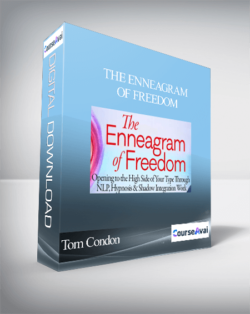 The Enneagram of Freedom with Tom Condon
₹14,110.00
The Enneagram of Freedom with Tom Condon
₹14,110.00
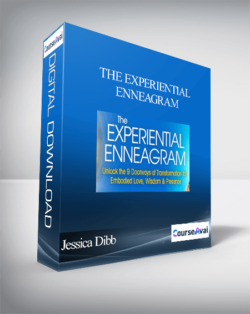 The Experiential Enneagram with Jessica Dibb
₹14,110.00
The Experiential Enneagram with Jessica Dibb
₹14,110.00
The Enneagram of the Virtues with Russ Hudson
₹14,110.00

